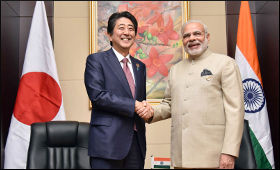|
|
|

|
Abe's visit and importance of Act East Forum
|
|

|
|
| Top Stories |
 |
|
|
|
Shubha Singh | 28 Dec, 2019
India-Japan relations have grown into a close strategic partnership in
the past decade. Regular annual summits between their leaders have
helped nurture the relations and made them among the fast-growing ties
for each country. Japan Prime Minister Shinzo Abe's visit to India from
December 15 to 17 will be his sixth bilateral summit with Prime Minister
Narendra Modi to further consolidate the bilateral relationship.
The
summit will take place in Guwahati this time, which will bring a focus
on Japan's development cooperation in the North-Eastern states. Japanese
organisations are actively involved in a variety of projects in the
North-East under the Act East Forum that was set up during Abe's visit
to India in 2017. The Act East Forum aimed to expand cooperation between
Japan and India in the North-Eastern region. Japan is the only country
that the Indian government has allowed to take up developmental projects
in the sensitive North-Eastern region.
India-Japan summits have a
wide agenda of bilateral and global issues. But during the discussions,
the Japanese side is likely to inquire about the implications of the
Maharashtra government's recent decision to review the bullet train
project. The Mumbai-Ahmedabad High Speed Rail project, or bullet train
project is among the most prestigious Japan-India projects. A shadow was
cast on the project when the new Maharashtra Chief Minister Uddhav
Thackeray said that his government would review the bullet train
project. However, he clarified that his government had not taken a
decision to cancel the project. The Maharashtra government is one of the
three parties involved in the project and would find it difficult to
cancel the project. But the project is likely to be in the doldrums if
it loses its priority as a Maharashtra government project.
India
and Japan held the first Two plus Two meeting of their foreign and
defence ministers, when they reviewed the progress in the Acquisition
and Cross-Servicing Agreement (ACSA), which is in the final stages of
negotiations. The logistics agreement is similar to those signed with
the United States and France and would provide access to each other's
naval facilities. Defence and security cooperation has expanded steadily
and India and Japan hold a series of defence exercises involving all
three wings of the armed forces. The two sides have recently agreed to
hold a joint exercise of fighter jets from Japan's Air Self-Defence
Force and the Indian Air Force next year.
The Act East Forum
brought together various agencies on both sides to identify specific
projects for development in the North-Eastern states. The cooperation
between Japan and the North-Eastern states ranges from key
infrastructure projects such as road connectivity, bridges, electricity,
water supply and sewage, to social and environmental sustainability
such as afforestation and community empowerment, as well as
people-to-people exchanges, including inviting youth from the North-East
to Japan. It has taken up construction of roads and highways in
Meghalaya and Mizoram, a biodiversity conservation and forest project in
Sikkim, other forest management projects in Nagaland, Meghalaya and
Tripura.
Japan supported the construction of the Imphal Peace
Museum, which was inaugurated in June this year to commemorate the 75th
anniversary of the Battle of Imphal during World War ll at Maibam Lokpa
Ching, also known as Red Hills. It was constructed with the support of
the Nippon Foundation in collaboration with the Manipur government and
the Manipur Tourism Forum. The museum displays exhibits from the war as
well as lists the casualties in the battle including the names of the
local people of Manipur who joined the Indian National Army (INA)
forces. It also has a section on the arts and culture of Manipur.
The
Imphal Peace Museum is located 20 km south-west of Imphal at the base
of the Red Hills, where the last battle between the British India Army
and the Japanese army was fought during World War II. About 55,000
Japanese soldiers died in the India offensive of the Japanese army. Many
of them died in the Imphal and Kohima battles, from March 8 to July 18,
1944 which are regarded among the fiercest battles of the Second World
War. Prime Minister Abe is expected to visit the Peace Museum.
|
|
|
| |
|
|
|
|
|
|
|
|
|
|
|
|
|
|
| |
| Customs Exchange Rates |
| Currency |
Import |
Export |
US Dollar
|
84.35
|
82.60 |
UK Pound
|
106.35
|
102.90 |
Euro
|
92.50
|
89.35 |
| Japanese
Yen |
55.05 |
53.40 |
| As on 12 Oct, 2024 |
|
|
| Daily Poll |
 |
 |
| Do you think Indian businesses will be negatively affected by Trump's America First Policy? |
|
|
|
|
|
| Commented Stories |
 |
|
|
|
|
|
| |
|